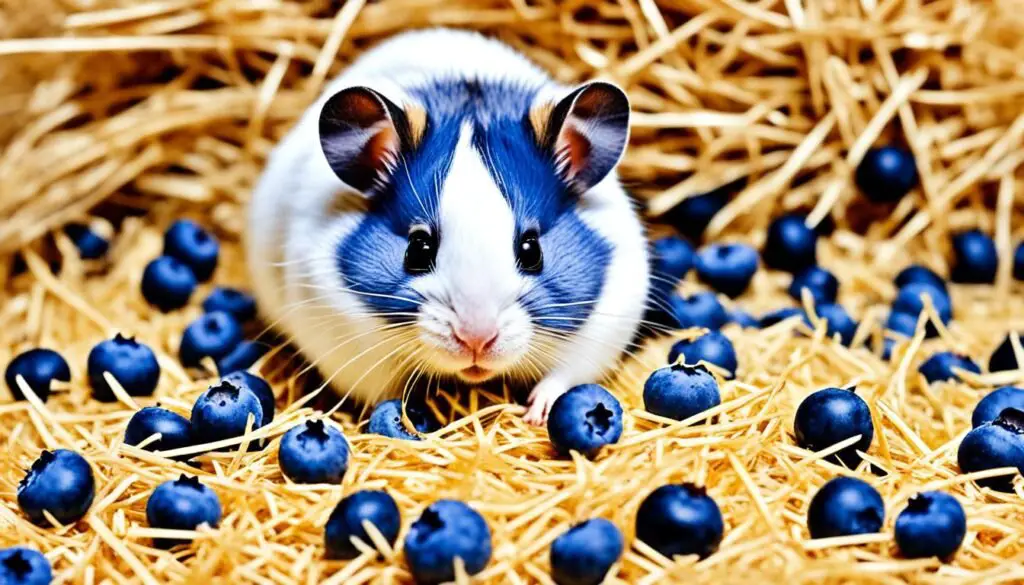Did you know that blueberries can be a tasty and nutritious treat for your furry little friend? Hamsters are known for their love of fruits, and blueberries are no exception. These small berries pack a punch when it comes to health benefits and can be a delightful addition to your hamster’s diet. However, it’s essential to know the ideal amount of blueberries your hamster can safely enjoy.
Safe Fruits and Vegetables for Hamsters
When it comes to fruits and vegetables, most everyday options are safe for hamsters, including blueberries. Other safe fruits for hamsters include apple, strawberry, melon, banana, peach, and nectarine. It is important to remove any pips or stones from the fruit before offering it to your hamster. Additionally, green vegetables such as broccoli, peas, and cucumber can also be given in small quantities. It’s best to avoid citrus fruits, onion, garlic, and rhubarb, as these can be toxic to hamsters.
Benefits of Feeding Blueberries to Hamsters
Feeding blueberries to your hamster can have numerous health benefits. These small fruits are not only a delicious treat but also provide essential nutrients to support your hamster’s overall health and well-being.
Blueberries are naturally low in calories, which makes them a great snack option for hamsters. This means that you can offer them these tasty treats without worrying about excessive weight gain.
What’s more, blueberries are rich in vitamin C, an important nutrient for hamsters. Vitamin C helps boost the immune system, keeping your furry friend healthy and more resistant to common illnesses.
But the benefits don’t stop there! Blueberries are packed with antioxidants, which can help reduce oxidative stress and inflammation in your hamster’s body. These antioxidants play a vital role in promoting overall health and preventing disease.
Some studies have even suggested that blueberries may have cholesterol-lowering effects in laboratory animals. While further research is needed to confirm if these effects extend to humans, it’s an interesting finding that highlights the potential health benefits of including blueberries in your hamster’s diet.
Adding blueberries to your hamster’s regular diet can also provide them with more variety, making mealtime a bit more exciting. Keep in mind that while blueberries offer many health benefits, they should still be offered in moderation as part of a balanced diet.
To give you a visual perspective on the importance of blueberries in a hamster’s diet, take a look at this image:
As you can see, these tiny fruits can play a significant role in enhancing your hamster’s overall health and happiness. Remember to provide a varied diet and consult with a veterinarian to ensure that your hamster’s nutritional needs are being met.
Serving Size of Blueberries for Hamsters
When it comes to feeding blueberries to your furry friend, moderation is key. The best serving size for blueberries, as well as any other fruit, is no bigger than your hamster’s ear. This ensures that they receive a small and appropriate amount of fruit as part of their overall diet. Remember, hamsters have specific dietary needs, and while blueberries can be a healthy addition, they should not be the main component of their diet.
Offering blueberries in the right serving size allows your hamster to enjoy the taste and benefits without overindulging. Blueberries offer essential vitamins and antioxidants that can contribute to your hamster’s overall well-being. However, it’s important to maintain a balanced diet by providing a variety of foods that meet their nutritional needs.
By understanding the appropriate serving size of blueberries and incorporating them into your hamster’s diet, you can provide them with a nutritious and enjoyable treat.
Precautions and Considerations
While blueberries are generally safe for hamsters, it is important to take some precautions and considerations to ensure your furry friend’s health and well-being. Hamsters have sensitive digestive systems, so it’s essential to introduce new foods, such as blueberries, gradually. This will help prevent any potential digestive issues and allow your hamster to adjust to the new addition to their diet.
When offering blueberries to your hamster, it is crucial to source fresh and high-quality berries. Opt for organic blueberries if possible to ensure they are free from pesticides or other harmful chemicals. By choosing top-quality blueberries, you can provide your hamster with the best nutritional benefits and minimize the risk of any adverse health effects.
It’s important to be aware that individual hamsters may have unique dietary needs or health conditions. Therefore, it is always wise to consult with a veterinarian before making any significant changes to your hamster’s diet. A vet can provide personalized advice to ensure that your hamster’s dietary requirements are met and that the introduction of blueberries aligns with their overall health status.
Gradual Introduction and Sourcing Quality Blueberries
When introducing blueberries to your hamster’s diet, it’s best to start with small quantities and observe how your hamster reacts. Begin by offering a single blueberry and monitor your hamster for any signs of digestive discomfort or allergic reactions. If your hamster tolerates the fruit well, you can gradually increase the serving size, but always within the recommended safe amount.
Sourcing fresh and high-quality blueberries is crucial to ensure your hamster receives the maximum nutritional benefits without potential exposure to harmful substances. Whether you obtain blueberries from your local grocery store or grow them in your garden, make sure to wash them thoroughly before offering them to your hamster. This will remove any potential residues and ensure cleanliness.
Remember that while blueberries can be a healthy and enjoyable addition to your hamster’s diet, they should not replace their main food source or become the dominant portion of their meals. Blueberries should be offered as occasional treats to provide diversity and enrichment to their diet.
Other Nutritional Considerations for Hamsters
While blueberries can be a healthy addition to a hamster’s diet, it is important to provide a balanced overall diet to ensure their well-being. Hamsters require a good hamster mix that provides the correct nutrients and protein levels. This mix should be the main component of their diet. Fresh foods, such as fruits and vegetables, can be given in small quantities as occasional treats to offer variety and enrichment.
When incorporating fresh foods into your hamster’s diet, including blueberries, it’s crucial to offer them in moderation. Remember, blueberries should not be the main component of the diet, but rather a small part of it. Hamsters have specific dietary needs, and it’s essential to ensure that they are receiving the necessary vitamins and minerals from their main diet, along with a good source of fiber.
Additionally, offering a variety of foods and textures can help keep your hamster engaged and prevent boredom. Consult with a veterinarian to ensure that your hamster’s diet is providing all the required nutrients. They can provide guidance based on your hamster’s specific needs and health condition.
Remember, while blueberries can provide health benefits, it’s important to maintain a well-rounded and nutritious diet for your furry friend. Providing the right balance of hamster mix, fresh foods, and consulting with a veterinarian will help ensure that your hamster stays happy and healthy.
Hamster Diet and Health
Maintaining a healthy diet is crucial for your hamster’s overall health. By providing a well-balanced and nutritious diet, you can help prevent various health issues and promote a longer lifespan for your furry friend.
Incorporating blueberries into your hamster’s diet can contribute to their overall well-being. Blueberries are packed with essential vitamins and antioxidants that can support your hamster’s immune system and overall health.
However, it’s important to remember that blueberries should be given in moderation. While they offer numerous benefits, too many blueberries can lead to digestive issues or weight gain in hamsters. It’s always best to offer treats like blueberries in small quantities and as part of a varied diet.
To ensure that your hamster is tolerating and benefiting from the addition of blueberries to their diet, it’s important to keep a close eye on their behavior, stool consistency, and overall health. If you notice any changes or concerns, consult with a veterinarian for professional advice.

Conclusion
Feeding blueberries to your hamster can be a healthy and delightful addition to their diet. These small fruits offer a range of health benefits, including essential vitamins and antioxidants. However, it’s crucial to remember that blueberries should not be the main component of your hamster’s diet. A well-balanced and varied diet, coupled with regular veterinary check-ups, is vital to ensure the overall well-being of your furry friend.
When introducing new foods like blueberries, it’s important to closely monitor your hamster’s reaction. Observe their behavior, stool consistency, and overall health to ensure they tolerate and benefit from the addition. Moderation is key when it comes to feeding blueberries to your hamster–a small and appropriate amount will provide a healthy treat.
Always consult with a veterinarian if you have any concerns regarding your hamster’s diet or overall health. Veterinarians can provide expert advice tailored to your pet’s specific needs. By following a well-rounded diet and seeking professional guidance, you can help your hamster lead a happy and healthy life.
